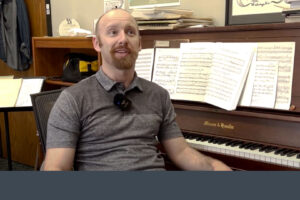
AUSTIN, Texas — A mounting perception that climate change is occurring could play a role in deciding the upcoming presidential election, particularly if significant numbers of younger Americans turn out to vote, according to the latest UT Energy Poll.
More than 9 out of 10 survey respondents (91 percent) under age 35 say climate change is occurring, compared with 74 percent of those age 65 or older.
Overall, 79 percent of respondents share that view — the highest percentage since the survey began tracking responses to the question more than four years ago — and 12 percent say climate change is not occurring, down from 16 percent in February.
“The percentage of Americans who say global climate change is occurring continues to rise,” said UT Energy Poll Director Sheril Kirshenbaum, “including clear majorities of both major political parties.”
The semiannual nationwide survey polled 2,043 Americans in September 2016 on a range of energy issues, from hydraulic fracturing and nuclear power to concern about foreign oil imports and a tax on carbon.
The survey shows that large majorities of Americans hold the view that climate change is occurring, regardless of political affiliation, gender, ethnicity and age.
For example, 89 percent of self-identified Democrats say climate change is occurring, compared with 62 percent of Republicans — up from just 45 percent in 2012. Eighty-two percent of men say climate change is occurring, compared with 75 percent of women; 86 percent of Hispanic respondents, 77 percent of African-American respondents and 81 percent of white respondents share that perspective.
Younger voters’ views could be especially important in the Nov. 8 presidential election, because a comparatively high percentage (63 percent) of them say energy issues will influence their vote. One-third (34 percent) of voters age 65 and older say energy issues will affect their vote.
The contrast between millennials and seniors can be seen in their views on several other energy issues:
- 62 percent of respondents under age 35 support decreasing the use of coal as an energy source, compared with 28 percent of those 65 and older.
- 52 percent of millennials support a carbon tax, compared with 23 percent of senior citizens.
- 66 percent of younger voters say they are likely to purchase an alternative fuel or electric vehicle within the next five years, compared with 27 of older voters.
“Millennials have strong feelings about energy issues, especially climate change,” Kirshenbaum noted. “If they show up at the polls, they could significantly influence the outcome of this election.”
The poll also revealed glaring differences among respondents based on their choice for president:
- 76 percent of self-described Democrats support taking steps to reduce carbon emissions, compared with 48 percent of Republicans.
- 63 percent of Hillary Clinton voters support decreasing the use of coal as an energy source, compared with 30 percent of voters who say they will vote for Donald Trump.
- 21 percent of Trump voters favor a carbon tax, compared with 57 percent of Clinton voters.
“Some of these findings reflect entrenched positions of the two parties,” Kirshenbaum said. “But it’s worth noting that nearly a majority of Republicans, along with 76 percent of Democrats, support steps to reduce carbon emissions.”
Other highlights from the latest UT Energy Poll:
The percentage of Americans who say they are familiar with hydraulic fracturing, or fracking, continues to hover just under a majority (47 percent). Of those familiar with the technology, 40 percent approve its use, down from 47 percent in February; 45 percent oppose fracking, compared with 37 percent last winter.
Meanwhile, the percentage of Americans who say municipalities should have the right to ban fracking within city limits even if state law otherwise permits it continues to rise. Of survey respondents familiar with fracking, more than two-thirds (68 percent) say cities should be able to prohibit fracking locally, up from 59 percent in February. Only 12 percent of those polled say cities should not have the authority to ban fracking locally, down from 19 percent last winter. More Democrats (47 percent) think cities should be allowed to ban fracking, compared with 26 percent of Republicans surveyed.
For complete topline results, more charts and other information about the nationwide, online survey, visit www.utenergypoll.utexas.edu.
Data from The University of Texas at Austin Energy Poll were weighted using U.S. Census Bureau figures, as well as propensity scores, to ensure that the sample’s composition reflects the actual U.S. population. The poll was developed the McCombs School of Business and is supported by the KBH Center for Energy, Law & Business. The survey intends to provide an objective, authoritative look at consumer attitudes and perspectives on key energy issues and is designed to help inform national discussion, business planning and policy development. This is the 11th wave of the Energy Poll, which was launched in October 2011.



